DECLASSIFIED UK
Revealed: The UK has spent £350-million promoting regime change in Syria
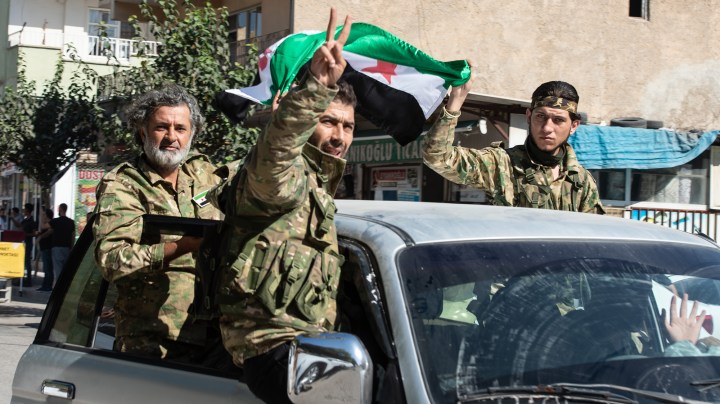
A controversial Whitehall body — the Conflict, Stability and Security Fund — has used large amounts of money from the British aid budget to support the opposition in Syria. Declassified outlines the extent of this funding for the first time.
- UK has funded 13 projects worth £215m supporting Syrian rebels and their operations in territory taken from the Assad regime, in past five years alone
- British government refuses to say which opposition groups it aids in Syria
- Some aid projects have involved ‘coordinating with armed groups’ and help them ‘manage better the territory they control’
The UK government has spent at least £350-million promoting opposition forces and projects in rebel-held areas in Syria, Declassified has found.
Several projects have directly supported what the UK government claims is the “moderate” armed opposition fighting the regime of President Bashar al-Assad.
Whitehall’s Conflict, Stability and Security Fund (CSSF), through which the projects have been funded since being set up in 2015, does not provide full details of its programmes. But Declassified has established that it has funded 13 projects supporting the Syrian opposition to the tune of £215-million in the past five years.
Of this sum, at least £162-million has come from the British aid budget which, the government claims, aims “to defeat poverty, tackle instability and create prosperity in developing countries”. This money is separate to Britain’s humanitarian aid programme in Syria.
The CSSF projects are especially contentious given the UK government’s refusal to say which rebel groups it aids in Syria. Many of the forces fighting the Assad regime are Islamist extremists and there has long been movement of personnel and equipment between the various rebel groups.
Project documents show British aid has for years been provided in areas of Syria where extremist groups are prevalent.
UK funding to Syrian rebel groups began soon after the uprising against Assad in early 2011. The aid projects have coincided with a British covert programme to overthrow the Syrian regime undertaken with its allies in the US, the Gulf states and Turkey, from where some of the CSSF projects have been run.
The UK has sought to install a pro-Western government in Damascus and nurture opposition-held areas as an alternative to Assad’s rule.
The Syrian regime has perpetrated war crimes including bombing schools and hospitals, alongside widespread torture, in a catastrophic war that has killed hundreds of thousands and created millions of refugees.
The figure of £350-million is an underestimate since it does not include activities financed from the UK’s so-called “black budget”, including intelligence operations.
The British government gives contradictory funding information to parliament and the CSSF is notoriously opaque, for example redacting the names of many contractors carrying out the projects.
A parliamentary committee has compared the CSSF to a “slush fund” for financing projects that do not “meet the needs of UK national security”.
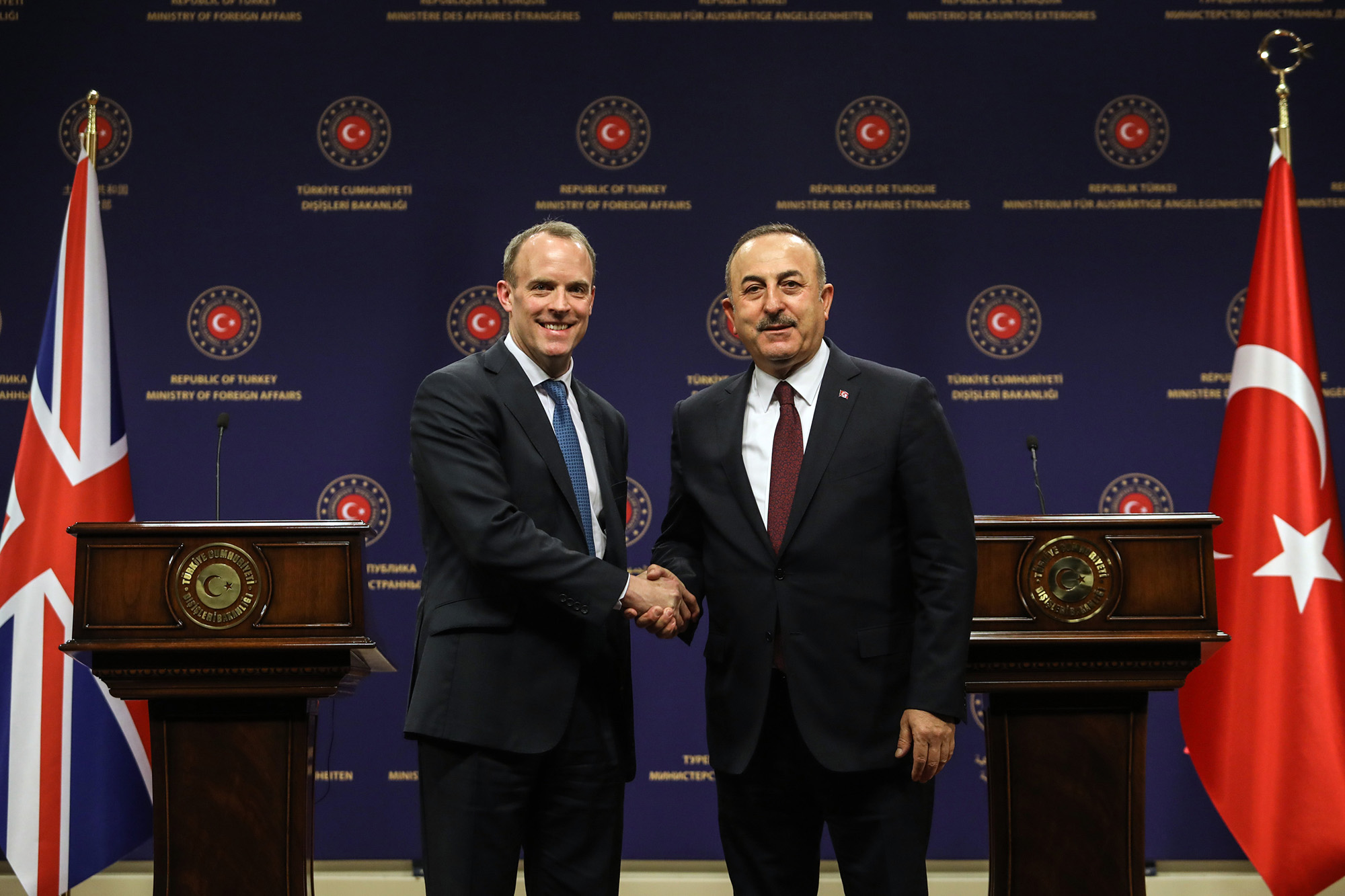
Turkish foreign minister Mevlut Cavusoglu (right) shakes hands with his British counterpart Dominic Raab in Ankara, 3 March 2020. (Photo: Getty Images)
The ‘moderate armed opposition’
The British government told parliament in April 2018 that the CSSF has “funded some projects in which certain armed groups of the Syrian moderate opposition have been involved”.
One project run by the Foreign Office called “Syria security strand” was worth £28.2-million during 2016-17 and provided “technical assistance and equipment” to the “Moderate Armed Opposition” to help it “to hold territory from extremists and regime”.
One of its goals was to “empower the Moderate Armed Opposition in southern Syria to manage better the territory they control”.
Some documents recognise that extremist armed groups could benefit from British aid. One project, called “Strengthening governance structures inside Syria”, was given a high risk rating over the “considerable presence of armed groups”.
Worth £27.5-million and running from 2016-20, the project aimed to “strengthen governance systems in moderate opposition areas”. Led by Britain’s then international development department, DFID, the project aimed to “enable the opposition to provide key services to local populations, providing an alternative to the regime and extremist groups”.
The project covered four provinces in northwest Syria — Rural Damascus, Aleppo, Idlib and Dara’a — which were recognised as “besieged areas” under “pressure from armed groups”. The project involved “coordinating with armed groups in order to facilitate delivery of services”.
A September 2017 review of the project noted its launch “coincided with the… resurgence of Hay’at Tahrir al-Sham’s [sic], an al-Qaeda affiliated group, in Idlib”.
The UK government has been worried about jihadist groups taking credit for its aid work: “There is a risk of proscribed groups interfering in civilian administration or attempting to take credit for services delivered by the programme”, programme literature notes.
Extremist group Hay’at Tahrir al-Sham, which was formed in early 2017 from the merger of several rebel forces including the al-Qaeda affiliate al-Nusra, now controls swathes of northwest Syria, where it is imposing its hardline doctrine on the four million Syrians who live there.
People in the area now endure the absence of freedom of expression or political opinion, have to follow strict rules regarding how they dress and cut their hair, while men and women are not allowed to mix in public.
The UK government has been aware that its secretive CSSF programmes are controversial, describing one in support of the Syrian opposition as “politically sensitive”.
But the government has consistently cited “security reasons” for not disclosing which rebel groups it supports.
Documents revealed in 2016 show the UK believed “moderate” opposition groups included Harakat al-Hazm, a force which fought with jihadists on the battlefield, and Jaish al-Islam, a Saudi-backed Salafist group which sought to impose a Sunni theocracy in Syria.
In 2015, a British court case collapsed when it was revealed that UK intelligence agencies were supporting the same Syrian opposition groups as Bherlin Gildo, a Swedish national on trial for terrorism offences.
Gildo was alleged to have attended a terrorist training camp and received weapons training to fight in Syria and was reported to have worked with al-Nusra.
‘Syria resilience’
The extent to which armed opposition groups in Syria can be considered “moderate” has long been a source of contention. Peter Ford, the UK ambassador to Syria from 2003-06, told a parliamentary enquiry that the existence of moderate groups in Syria was “largely a figment of the imagination”.
The British government has insisted the moderate opposition is “made up of people who subscribe neither to the values of the regime, nor of ISIL [Islamic State], nor of al-Qaida”.
The CSSF documents note that “the more we can support the opposition to work together collectively and coherently, the more we can help to demonstrate that they are a viable alternative to both Assad and extremist groups”.
One aid project called “Syria Resilience”, worth £26.9-million during 2017-20 and run by the Foreign Office, was intended to “give credibility to the moderate opposition” by enabling it to provide services to local communities.
Syria’s national opposition grouping has long been funded by the CSSF. A December 2015 document notes that the UK provided advisers, training and logistical support to the Syrian National Coalition’s secretariat and media centre in Istanbul where the UK also “offered negotiation and communications support”.
A key aim has been that the “opposition develops coherent policy positions, communicates them and is better able to negotiate effectively”.
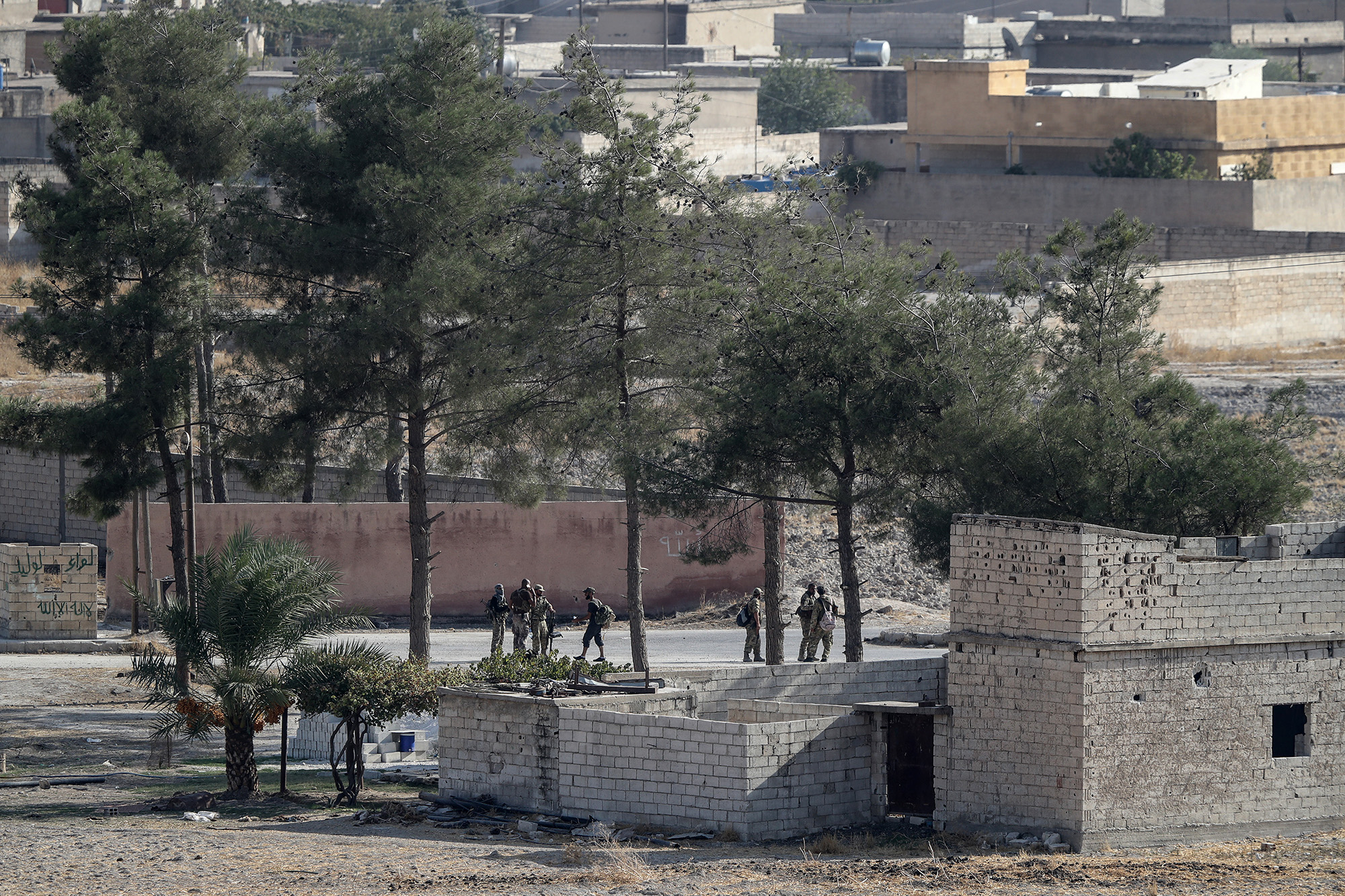
Members of the Free Syrian Army advance in the city of Tel Abyad on 13 October 2019. (Photo: Burak Kara / Getty Images)
‘Community policing’
One controversial CSSF project was UK support to the so-called Free Syria Police, intended to be a community-led security force working in opposition-controlled areas such as Idlib, Aleppo and Eastern Ghouta.
British support came via a programme known as Access to Justice and Community Support (AJACS), run by private consultancy firm Adam Smith International, a major UK aid contractor.
AJACS was temporarily suspended in December 2017 after BBC Panorama aired a programme, called “Jihadis You Pay For”, about corruption and aid funds reaching the hands of terrorist groups.
It alleged that Adam Smith International knowingly funded terrorist activities or failed to act swiftly after discovering that a portion of funds was reaching terrorists. The programme uncovered links between two Free Syria Police stations and courts being run by al-Nusra, and said that some police officers were being forced to hand over funds to extremist groups controlling the area.
The British government and Adam Smith International denied the allegations, and resumed the project in early 2018.
A year before the Panorama programme, in June 2016, the UK government claimed that project “recipients have been carefully selected to prevent equipment being given to those involved in extremist activities”.
However, the same statement acknowledged: “The risk of diversion is still a real possibility.”
British funding of the Free Syria Police lasted for four years and stopped in September 2018. CSSF documents indicate the UK provided at least £8-million in funds, involving the provision of training, communications equipment and vehicles.
The UK also supported “community policing” in southwest Syria, which one document described as “one of the last areas to remain under the control of moderate opposition groups”. However, the project was curtailed in mid-2018 as Syrian regime forces retook the south of the country.
Funding the rebels
The government provides contradictory figures on the level of its support to the Syrian opposition. In March 2018, parliament was told that such funding through the CSSF amounted to £32-million during 2011-17, which included “political support and non-lethal equipment”.
However, a few months earlier, in September 2017, foreign minister Lord Ahmad said CSSF funding for Syria amounted to £199-million for the three years to 2017/18. He said this included funds to “those groups opposed to Daesh [Islamic State] and Assad as well as Syrian civilians and their communities”.
Two years before this, in December 2015, the government stated it had provided “more than £67m” to the Syrian opposition, including to the armed opposition, the Syrian National Coalition and “media activists”.
Declassified has been able to establish that over the past five years alone, the CSSF has funded 13 projects worth £215-million which support the Syrian opposition and its provision of services in rebel-held areas.
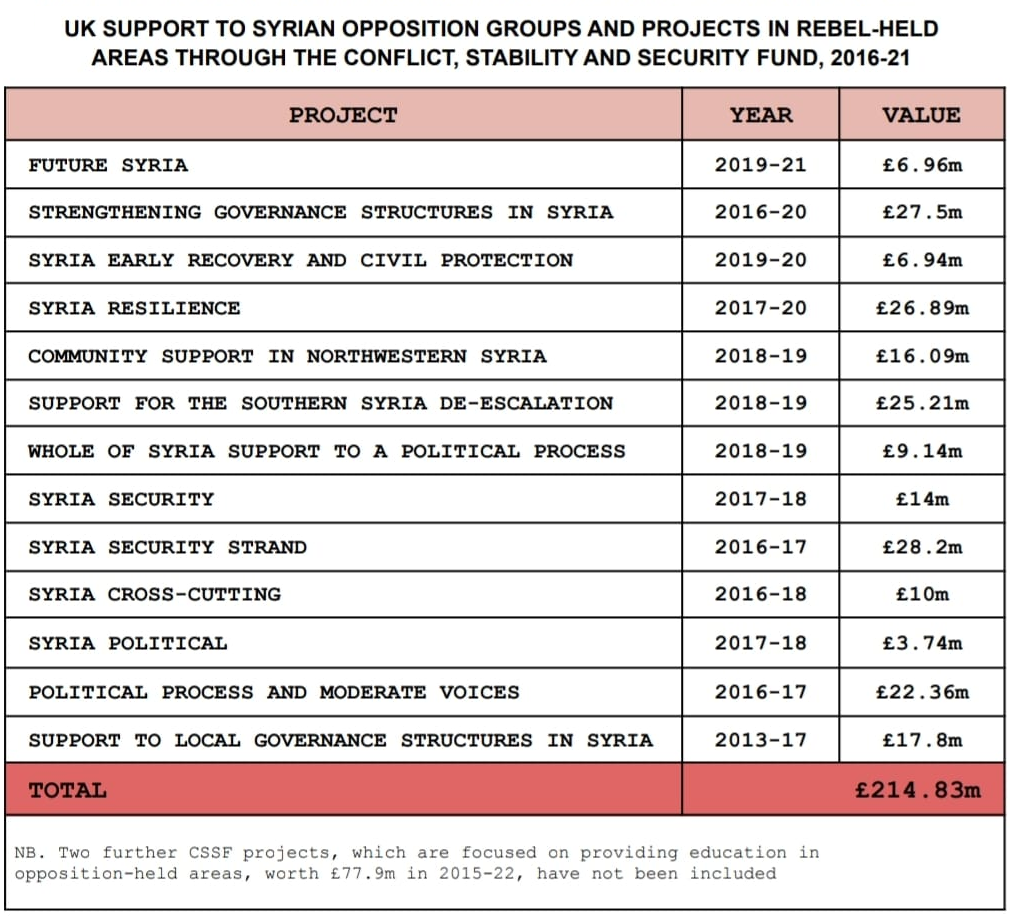
Media operations
The UK has long been a significant funder of the Syrian opposition’s media operations. Journalist Ian Cobain revealed in 2016 that the British government was “waging information warfare” in Syria by funding media activities for some rebel fighting groups.
Britain funded five covert programmes in Syria that began in 2012, involving the creation of a network of citizen journalists across the country to shape perceptions of the conflict.
The UK was shown to be covertly running parts of the Syrian opposition. It awarded contracts to communications companies that selected and trained opposition spokespeople, managed their press offices and developed their social media accounts.
These covert propaganda programmes were “poorly planned, probably illegal and cost lives”, according to an internal review of the initiative uncovered by Cobain.
The CSSF documents show Britain sought to use “strategic communications to enhance moderate voices and provide alternative, moderate narratives that counter and undermine those of the regime and violent extremist groups”.
Some of these projects may still be running. One, called “Future Syria Programme”, which is worth £6.96-million from 2019-21, lists one aim as: “Russian/regime narratives are challenged and disinformation countered.”
The document makes clear it will challenge disinformation “outside Syria, amplifying truth and amplifying the views of moderate Syrians”. The Foreign Office manages the project but documents have redacted the names of its implementers so it is not clear who is running the campaign.
In December 2015, the UK government noted it had spent £5.3-million training “more than 300 Syrian journalists and activists… in order to develop an independent Syrian media”.
This involved establishing “a network of independent media outlets across Syria”, which was reaching Syrians through radio, TV and the distribution of magazines.
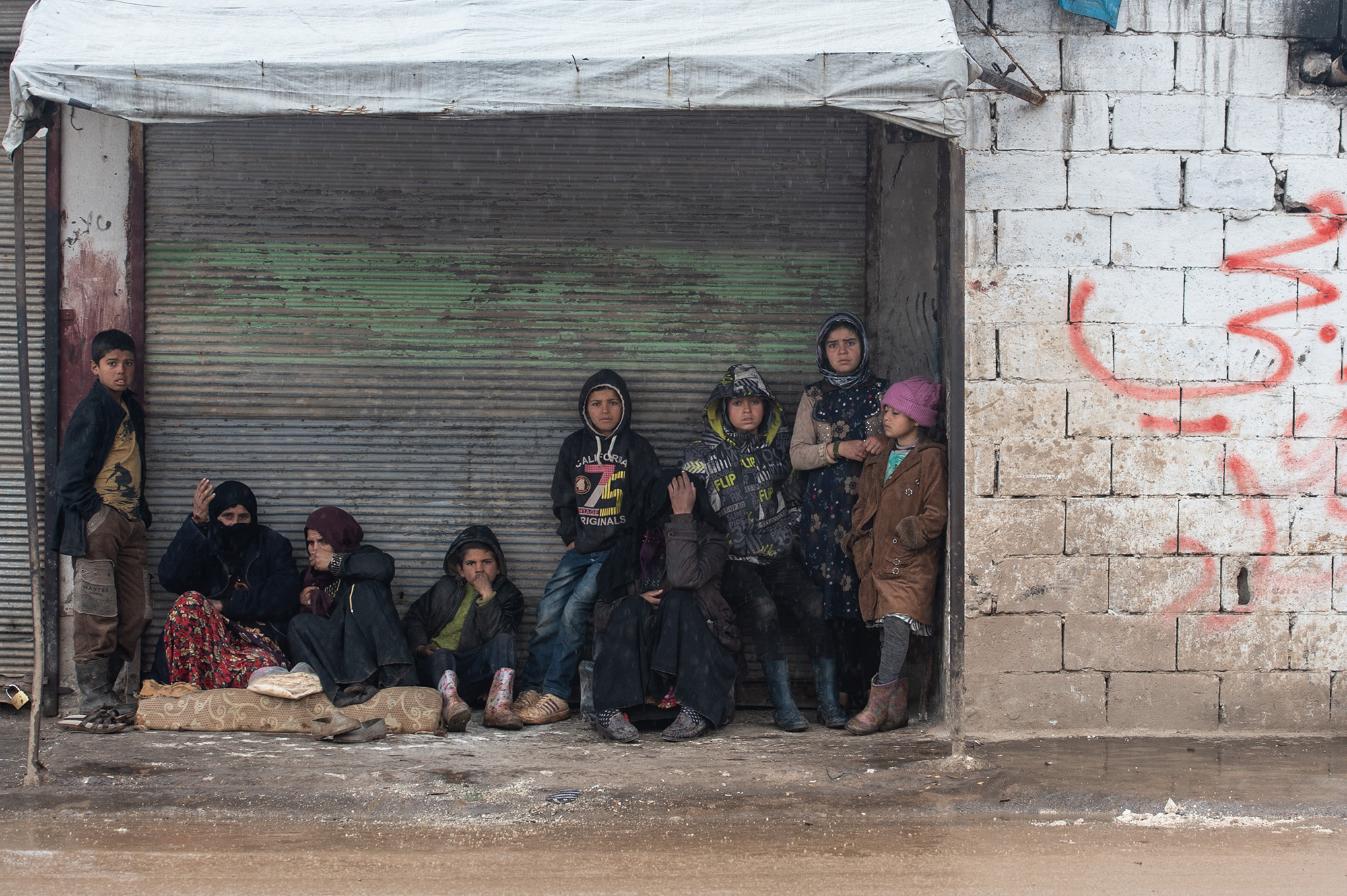
Displaced Syrians wait in front of a closed shop on 21 February 2020 in Idlib. (Photo: Burak Kara / Getty Images)
UK covert action
Britain’s role in the war in Syria has been distinctly under-reported and mis-reported in the UK mainstream media. While the press has widely covered UK military operations against terrorist group Islamic State, its covert operations against the Assad regime and in support of opposition groups have received much less attention.
The media has repeated government lines about atrocities committed by the Assad regime but opposition forces have been largely given a free pass. Many reports fail to note that in several parts of Syria, rebel groups are dominated or influenced by extremists.
Evidence suggests Britain began covert operations against the Assad regime in late 2011 or early 2012. The UK’s external intelligence agency MI6 was reportedly involved in arms shipments, training and organising the opposition in a secret operation with its US and Middle Eastern allies.
The Assad regime shot peaceful protestors in the streets in the early stage of the uprising, which encouraged armed opposition to it, fuelled by external supplies of arms, aid and training. British intelligence and military operations against Assad are known to have continued until at least mid-2018.
Covert and overt policies in support of Syrian rebels by foreign actors such as the UK helped to turn the uprising into a civil war and contributed to prolonging it.
Yet the mantra repeated in publications such as the Guardian and its sister the Observer is that Britain has been largely uninvolved in Syria. One Observer editorial was titled “The West’s shameful failure to act” and described Western governments’ “neglect” of the war.
It is unclear if this reporting was influenced by CSSF-funded media operations. DM
Mark Curtis is editor of Declassified UK, an investigative journalism organisation that covers the UK’s role in the world.
Follow Declassified on Twitter, Facebook and YouTube. Sign up to receive Declassified’s monthly newsletter here.
You can become a member and supporter of Declassified by visiting here.















 Become an Insider
Become an Insider
And all of this UK effort was for nothing. It achieved nothing as Bashir has been firmly entrenched himself in Syria during the latest election for another term despite his sickening well-documented crimes against his own citizens.